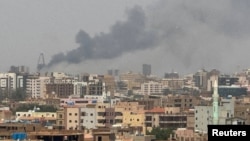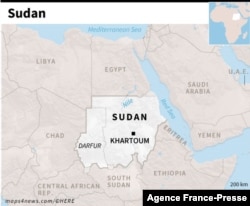Sudan's army on Thursday launched an early morning offensive in the capital, Khartoum, against the paramilitary Rapid Support Forces in what appeared to be the army's biggest operation since the conflict began, sources within the Sudanese military and witnesses at the scene said.
The army hit RSF positions in the capital with artillery and airstrikes, according to the reports. The rebel group has controlled much of the capital since fighting erupted in April 2023 between Sudan's army chief, General Abdel-Fattah Burhan, and RSF commander Mohamed Hamdan Dagalo.
The two generals were once allies in Sudan's transitional government after a 2021 coup but became rivals for power.
Thursday's military offensive was launched before Burhan's address to the United Nations General Assembly in New York, where he said any peace efforts would have to include RSF giving up its arms. He also accused unnamed countries of backing RSF's efforts by supplying the rebel group with men, money and weapons. The general said, however, that the army is "proceeding to defeat and dislodge these aggressors, no matter how much assistance and support they find."
A recorded speech by RSF commander Dagalo was heard by the General Assembly after Burhan's speech. Dagalo said, as he has many times before, that RSF is open to a nationwide cease-fire that would permit aid distribution.
Reports from Khartoum said army troops crossed two key bridges over the River Nile that separate government-controlled areas in Omdurman from Khartoum proper, which is controlled by the RSF. Agence France-Presse reposted Sudanese army footage of troops celebrating the recapture of territory within the capital.
The army's offensive coincided with a ministerial meeting on the conflict at the General Assembly, where U.N. agencies and member states called for immediate action to protect civilians, scale up humanitarian assistance, and end fighting.
Millions face acute hunger
U.N. reports state that an estimated 20,000 people have been killed and thousands injured since the conflict erupted in April 2023. The fighting has also created the world's worst hunger crisis, with nearly 26 million people — more than half the country's population — facing acute hunger.
The civil conflict also has created a regional refugee crisis, with an estimated 8.1 million internally displaced persons and another 2.2 million driven across the border.
Guterres shares concerns
U.S. Secretary-General Antonio Guterres met with General Abdel-Fattah Burhan — head of Sudan's transitional government — on the sidelines of the General Assembly Wednesday.
A readout from that meeting said Guterres expressed deep concern about the escalation of the conflict and the risks of regional spillover. The statement said they also discussed the need for an immediate, lasting cease-fire and the importance of genuine dialogue leading to an inclusive negotiated peace settlement.
The conflict has spread to Sudan's Darfur region where, the U.N. human rights office reports, fighting has intensified for control of the northern city of El Fasher. The office said the RSF, with the support of local tribal militia, besieged the city in May.
The heaviest recent fighting took place September 20 and 21, when artillery claimed at least 20 civilians and destroyed shops in the city's main market.
In a video statement Thursday, U.N. Human Rights spokesperson Jeremy Laurence said his office has documented incidents of civilians being killed as a result of shelling and airstrikes by both RSF and Sudanese Armed Forces.
They also have documented cases of summary executions, sexual and gender-based violence, and reported abductions by the RSF and allied militias. Laurence said the office is calling on the international community, including the U.N. Security Council, to take action to protect civilians in Sudan and ensure respect for international law by all parties.
Some information for this report was provided by The Associated Press, Reuters and Agence France-Presse.






